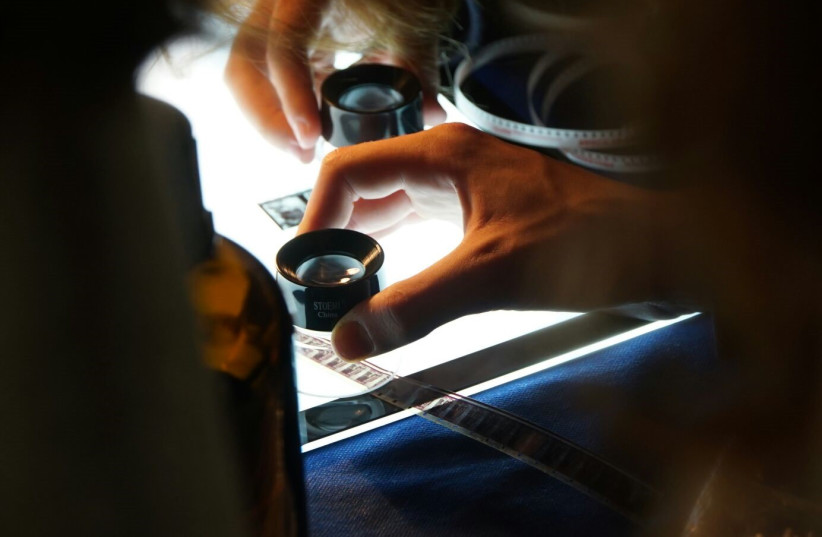
The medium of cinema is timeless and magical. Sitting in a movie theater, the lights go off, the projector starts rolling, and you get transported into a new world. Whether it is an epic fantasy story, a gritty crime thriller, or a dramatic space opera, the magic of movies lets viewers go on an adventure, seeing new worlds and stories.
Israel has its own cinematic tradition and history. These movies, and many others, are archived and screened at the Jerusalem Cinematheque, and Roni Mahadav-Levin is the man in charge.
Originally from Haifa, Mahadav-Levin was a regular at the Haifa Cinematheque, opened by Israeli film archive pioneer Lia van Leer in the 1950s. Then he wound up in Jerusalem, where he would find work at Van Leer’s next creation: The Jerusalem Cinematheque.
As CEO of the Jerusalem Cinematheque, Mahadav-Levin is responsible for more than the day-to-day running of the theater. He also is in charge of the Israel Film Archive, home to a vast collection of films, reels, and more aimed at preserving the Jewish state’s audiovisual history.
He is also heavily involved in one of Israel’s biggest cinema events of the year: The Jerusalem Film Festival, which began yesterday and runs until July 27.

Ahead of the festival, In Jerusalem sat down with Mahadav-Levin to discuss his work and the magic of movies.
Tell me about yourself and how you got into working with movies.
When I was a teenager growing up in Haifa in the 1980s, the local cinematheque was my second home. I’ve seen hundreds of films of all kinds. I would go to watch films every other day, sometimes sneaking into ones I was too young to enter. I remember seeing A Clockwork Orange perhaps a year or two earlier than I should have… Oddly enough, the young Malcolm McDowell at the time is now in the cast of the opening film of the upcoming Jerusalem Film Festival, Thelma, again as the villain.
Tell me about the history of the Jerusalem Cinematheque and how you started working there and eventually began running it.
My cinematic career actually started at the Jerusalem Cinematheque, almost 30 years ago. As a student in Jerusalem, I took an evening job as a cashier at the Cinematheque, and during my years of study and working here, I also joined the production of the film festival.
When I left, it was Lia Van Leer who recommended me for another position in the film industry. From thereon, I remained working in the film industry, distributing or curating films in different venues.
I returned to the Jerusalem Cinematheque six years ago, and as of 2022 I am as the CEO of this magnificent establishment, with the Israel Film Archive and the Jerusalem Film Festival at its heart, while active all year round to the public.
What’s the difference watching movies in a theater vs at home?
To truly remember the difference of seeing films at the cinemas rather than on the TV screen, it’s best to go back to childhood, whether your own or your children’s.
I still remember the first time my father took me to the cinema (it was a James Bond film), and I strongly remember, not so many years ago, the first time I took my daughter to the cinema. Even though she already had watched films at home, she couldn’t stay in her seat, jumping from side to side, totally absorbed in the screen.
The cinema hall experience forces you to halt your daily life for two hours, shut your phone, pause every other thing, and get truly immersed in the story – something you don’t get when watching a film at home.
Have things changed amid the rise of streaming?
Streaming is a different experience. It’s not bad by itself, but it’s still different and provides something else, in my opinion.
We have seen this especially after COVID. People were anxious to go out, share experiences with other people, and watch films together.
What does it mean to you to host different film festivals?
The Jerusalem Film Festival is a cinematic event like no other – 10 days of over 300 screenings in Jerusalem. But throughout the year, the Cinematheque holds many other festivals of different scales and genres.
The experience of meeting people after a marathon of films they watched that day and listening to their stories, excitement, and even criticism about a film, and then getting into long discussions about the art of cinema, is very rewarding and justifies the hard work invested in such an event.
And when we host international and local directors, actors, and leading voices from the world of cinema, it is gratifying to see their encounters with the audience and the conversations – on stage and off stage – that are created here.
Has the war impacted your business?
Of course, as it affected everyone. The Cinematheque was one of the first cultural institutions in the country to reopen its doors after Oct. 7, just one week later, offering films for free to the audience for almost two months.
It was a pleasure watching families gathering during daytime, from all sectors in Jerusalem, to watch films together – even while those screenings were occasionally interrupted by sirens.
Since the beginning of 2024, we went back to our normal activity. And, of course, the Jerusalem Film Festival is happening as planned. But the war’s impact is evident all the time, on people’s faces and in our minds.
We will host dozens of international guests this year as well, and we hope many film lovers join us during the 10-day festival and get absorbed in the different stories on screen, and maybe even derive some comfort, perspective, or hope from them.
We hope to see the hostages coming back very soon and an end to this war and violence already.■
